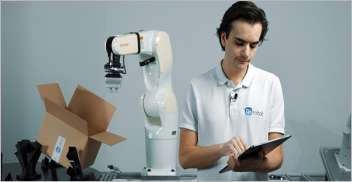Elysium Robotics recently announced it has developed artificial muscles for high-dexterity applications such as humanoid robots and prosthetics.
Mark Hammond, Elysium co-founder, said the company’s actuators can be used to produce a low-cost hand with human performance. A 27 degree-of-freedom hand can be built for under $1,000 using the company’s technology.
Elysium has created a soft robotic dielectric elastomer actuator (DEA) that can be mass-produced at low cost, with a performance and footprint similar to human muscle. By applying a voltage across the fibers, tension can be modulated, and size and strength controlled just like human muscles.
Current actuators limited by multiple factors, co-founders say
Hammond and Rodrigo Alvarez-Icaza, Elysium Robotics CEO and co-founder, said humanoid robots are ideal for automating manual tasks. Yet, humanoids have thus far struggled to make it beyond the concept phase, and a large gap exists between human capability and humanoid performance.
While adoption of single-purpose cobots is widespread in industrial settings, the potential of general-purpose humanoid robotics remains largely untapped, with their appeal being versatility, Elysium’s co-founders said.
Though motors and other current actuation technologies are sufficient for some motion needs, Hammond and Alvarez-Icaza said they have significant limitations for niche applications such as prosthetics and robotics, which may require a more compact and efficient source of motion production. The co-founders said problems with existing actuation methods for humanoid and prosthetic applications include costs, weight, bulkiness, inefficient battery use, and noise.
Dielectric elastomer properties resemble human skeletal muscles
The quest for efficient, powerful, and lightweight actuation technologies has focused on the use of dielectric elastomers for creating “artificial muscles.” Hammond and Alvarez-Icaza said DEAs have been promising candidates for soft actuators, and have commonly been referred to as artificial muscles since their emergence in the 1990s, primarily due to their elastic nature, activation by electricity, high actuation speeds, and high work densities - all resembling the properties of human skeletal muscles.
Dielectric elastomers in the shape of thin films have been heavily investigated, but Elysium’s co-founders said these do not produce forces comparable to that of human skeletal muscles without requiring extremely complicated fabrication processes, which can render their practical uses limited. DEAs can be fiber-shaped to more closely mimic skeletal muscles and to enable novel structures.
Elysium said it has produced fibers with the required dimensions and properties for creating muscle-like actuators. Elysium’s design does not require motors, gearboxes or other moving parts. Hammond and Alvarez-Icaza said fibers are controlled through a voltage differential and can be extremely precise and easy to control.
Elysium described its current performance characteristics:
- Customizable Sizes: Scalable from single fibers to thousands.
- Lightweight: 50% lighter than servo motors.
- Form Factor: Motors are bulky and require transmissions. Elysium has a natural form factor comparable to human muscle.
- Low Power and Low Thermal Footprint: Lower holding power then servos with 40% efficiency and no holding current.
- Cost: less than 10% of a comparable servo motor.
- Speed: 50 milliseconds activation time.
- Robust: Can stretch without breaking.
- Safety: Food grade and intrinsically compliant.
- Accuracy: within 1% intrinsic hysteresis.
- Noise: 0 dB, no noise.
- Strength: 150 kPa, or about 21.8 pounds of force per square inch.
- Reliable: greater than 5 million cycles.
- Controllable: Smooth movement.
Article topics
Email Sign Up
















